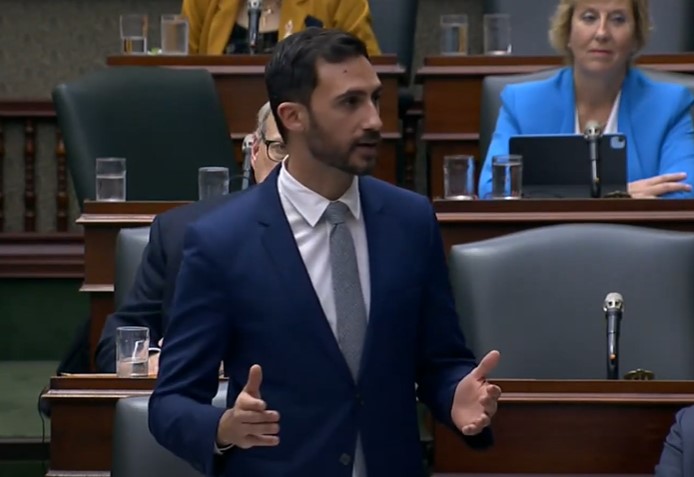
Minister of Education Stephen Lecce rises during Question Period at Queens Park in Toronto, Ontario, on October 26, 2022. (Screenshot/Legislative Assembly of Ontario)

By Isaac Teo
The Ontario government is cracking down on cellphone use during class time and banning vaping in schools as part of efforts to improve children’s health and reduce distractions in classrooms.
Speaking at a press conference on April 28 that accompanied a news release that day, Education Minister Stephen Lecce said his government will “go back to basics” by combating the negative impacts that cellphones, mobile devices, social media, and vaping are having on in-class learning.
“Every parent and teacher we speak to has shared the growing problem of cellphone distractions in class during instructional time, in addition to this disturbing rise of vaping in schools amongst our youth. Students acknowledge this reality too,” Mr. Lecce said.
“We need to be bold. We need to be comprehensive. And we need to act with urgency today, as we restore focus and safety and common sense back into our school system.”
Under current measures, cellphones can only be used in class for education, health, and medical purposes and to support special educational needs. However, enforcement of the rules hasn’t been easy for schools and teachers.
Mr. Lecce says the new changes will ensure compliance and consistency provincewide.
‘Out of Sight’
Effective September, students in kindergarten to Grade 6 will be required to keep their cellphones on silent and “out of sight” for the entire school day unless they have explicit permission to use it, the province said in the news release
“For students in Grades 7 to 12, cellphones will not be permitted during class time unless explicitly directed by the educator.”
Students who fail to comply will be asked to surrender their phones, according to an April 28 Ontario government memorandum advising school boards of revisions to the provincial code of conduct for school communities.
“If the student does not hand in their personal mobile device when required, they must be sent to the Principal’s office” and could face suspension from school, the memo said.
“The government will provide mandatory training for teachers and new supports for students and parents,” the news release said, and students’ report cards will include comments on their distraction levels in class.
The new policy will also see the removal of social media websites from all school networks and devices—a move that Ontario Premier Doug Ford’s government says is the first among jurisdictions in Canada.
Mr. Lecce’s announcement comes after four major school boards in Ontario launched lawsuits against Meta, Snapchat, and TikTok in March, accusing the social media titans of harming students’ mental health and disrupting the education system.
The Toronto District School Board (TDSB), Peel District School Board, Toronto Catholic District School Board, and Ottawa-Carleton District School Board, are suing the platforms for $4.5 billion in total damages, according to their separate but similar statements of claims filed with Ontario’s Superior Court of Justice on March 27.
The allegations have yet to be proven in court.
‘Review the Details’
The Epoch Times reached out to the school boards regarding Mr. Lecce’s announcement. The TSDB responded that it will need to “review the details” to ascertain how the new measures will impact its cellphone policy that was announced at the end January.
“As part of this policy development process, the TDSB had been planning broad consultations with students, staff, families and experts, along with a review of best practices from around the world, to better understand what will and won’t work,” spokesman Ryan Bird said in an emailed statement.
The other three school boards did not respond by publication time. The same goes for Meta, Snapchat, and TikTok.
The Ontario provincial government also said in its news release that it will strengthen the rules around students caught using or carrying vapes or cigarettes.
“Students will be required to surrender these products, along with parents being notified immediately of the situation,” it said.
“The government also officially announced $30 million in the 2024 Budget to install vape detectors and other security upgrades in schools.”